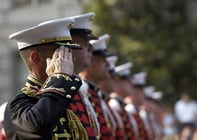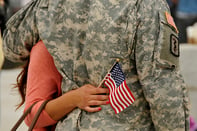Published on
Improving Support and Services for Military Connected Students Even with Limited Resources

With the passage of Post 9/11 Veterans Education Assistance Act of 2008, more commonly referred to as the Post 9/11 GI Bill, institutions of higher education experienced a dramatic influx of military-affiliated students onto their campuses. The Department of Veteran Affairs reported a 42-percent increase in eligible veterans and dependents utilizing education benefits in the first year following the law’s implementation. Some intuitions of higher education were able to respond by expanding programs and services, and establishing offices dedicated to serving a military-affiliated student population. In the 2012 report “From Soldier to Student II: Assessing Campus Programs for Veteran Services” the American Council on Education found that the largest challenges reported by institutions and military affiliated students were a lack of funding and space. So, what then, are institutions that do not have the resources to hire specialized staff or provide dedicated space to do?
For institutions whose budgets do not allow such expansion of services, ensuring staff, faculty, and students are better informed about the various needs of, and challenges faced by, the military-affiliated student population is one way to provide the support these students need. In studies conducted across the country, military-affiliated students have reported feeling as if other members of their campus community did not appreciate, understand or respect their service. This is understandable when you consider that only seven percent of Americans have served in the military and only half of one percent have served since September 11, 2001. A wide gap exists between those who have served and civilians, and the military-affiliated student is not the only one to experience a cultural change after they arrive on campus.
Military affiliated students must navigate what is often a bureaucratic process of enrolling, as well as the social aspect of finding their place at an institution of higher education. Here are a few basic steps institutions can implement to make the transition from the military to college less challenging for these students:
First, institutions should develop procedures for identifying these students in order to provide the appropriate support services, policies and procedures. This can be done in a number of ways from asking about military service on an application to identifying those students utilizing education benefits from the U.S. Department of Veteran Affairs
Second, campuses should consider requiring, or strongly recommending, that faculty and staff receive training that provides a general overview of the military culture and structure. This professional development opportunity would aid college employees in understanding how military culture impacts a student’s transition and the ways in which they can make that transition a smooth one. Often referred to as Military Cultural Competency, or Green Zone, training addresses possible misconceptions about the military, creating a knowledgeable campus community and welcoming environment for students.
Third, institutions can support the creation of military-affiliated student organizations or partner with local veteran community-based organizations. This will provide military-affiliated students with the opportunity to reconnect with those who have had similar experiences. Organizations such as Student Veterans of America can assist in the establishment of a student organization and local Veterans of Foreign Wars or American Legion posts are always looking for new membership.
Fourth, institutions can establish points of contact for military-affiliated students in each department or office.
As these same military-affiliated students graduate from our higher education institutions, they encounter similar challenges when applying, interviewing and beginning a new job with a civilian employer. Therefore, many of the same recommendations regarding military cultural competency would be in place for civilian employers as they were for the staff, faculty and student bodies in higher education.
One of the ways that higher education can positively impact the military-to-civilian employment transition is by training civilian employers on Military Cultural Competency. Joe Schaffer, associate dean of corporate and alumni engagement and executive education at Rutgers Business School says, “individual civilians and civilian employers play an invaluable role in helping veterans make successful transitions from the military to business careers. At Rutgers Business School, we feel strongly that the burden of career transition doesn’t lie solely with veterans themselves and their college or university, but also resides squarely with civilian employers.”
Referring primarily to human resource professionals, hiring managers, and immediate supervisors, as well as those responsible for diversity and inclusion, veterans’ initiatives, and employee resource groups, there is as much need for increased military cultural competencies within civilian organizations as there is within higher education.
In a 2016 webinar for corporate participants, touching on the topic of cultural competencies, Ann Treadaway (one of this article’s co-authors) gave a brief “Military 101,” which consisted of common acronyms and jargon, and even defined what a veteran is. It’s surprising to note how many definitions exist and just how much they vary. But it was very reassuring to have webinar participants from businesses, large and small, who wanted to learn more about educating their current employees to provide a warm and enduring welcome to new veteran hires.
Colleges and universities, along with civilian employers, can ease the transition process for veterans by increasing the military cultural competency within their organization. Rutgers Business School partners with the Rutgers Office of Veteran and Military Programs and Services to provide Military Cultural Competency training in a variety of formats: in-person, online, video-conferenced, etc. There is a version for higher education and for employers. Even without formally expanding staff dedicated to veteran initiatives, Military Cultural Competency is a way to ensure support is provided at many touch points throughout the organization. If your school offers this, take advantage of it! If it doesn’t, reach out to a school that does.
– – – –
References
McBain, Lesley, Young M. Kim, Bryan J. Cook, and Kathy M. Snead. From soldier to student II: Assessing campus programs for veterans and service members. Washington, DC: American Council on Education, 2012.
Author Perspective: Administrator



